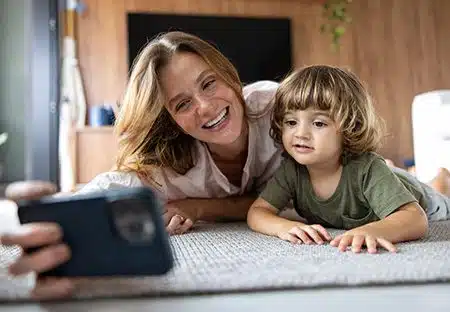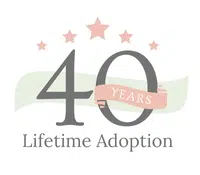What is Open Adoption?
 When looking into growing your family, the many options can be overwhelming. What is an open adoption, and is it the right path for you?
When looking into growing your family, the many options can be overwhelming. What is an open adoption, and is it the right path for you?
In an open adoption, the birth parents and adoptive family maintain an open relationship. However, the bottom line is that open adoption means many things to many people.
For example, the degree of contact between the families is something to be agreed upon before the adoption is final.
Lifetime Adoption has over 35 years of experience supporting open adoptions. Moreover, we’ve chosen to specialize in open adoptions. It is widely believed that such openness, in most adoptions, is in the best interest of all involved. Additionally, these adoptions are often safer and have fewer reclaims.
How Does Open Adoption Work?
Open Adoption Definition
With open adoption, the birth parents and the adoptive parents stay in contact before, during, and after placement. This can include phone calls, letters, video chats, or in-person visits. The way you connect will always be based on what feels comfortable for everyone involved. This leads to a much more connected experience in which you have control.
Open Adoption Rules
The rules of open adoption depend on the state you live in. Rules are also outlined in the agreement between you and the birth mother.
Some states allow legally enforceable adoption contact agreements. Others keep arrangements more open and flexible.
Typically, rules cover:
- What type of contact is agreed upon (letters, visits, calls).
- How often communication will happen.
- Whether updates will continue throughout the child’s life.
In addition, open adoptions allow the adoptive parents to meet the birth mother. They can speak with her before making the decision to move forward. Through open or semi-open adoption, all parties can decide on the amount of contact they wish to have in the future.
As a prospective adoptive parent, you always have the choice to set boundaries. You can adjust communication over time. The birth mother has those options, too.
Ultimately, you have the power to decide how open you want the adoption to be.
Why Birth Parents Choose Open Adoption
Normally, birth parents who choose open adoption are looking for reassurance. They want confirmation that their child is growing up safe and happy. Usually, birth parents seek contact through periodic letters, emails, photos, or possibly phone calls, from the adoptive family.
However, there are some birth families who do not want any further contact after the adoption until the child is 18 years old. And in an open adoption, the choice is as much the birth parents’ as it is yours. So your openness will also be taken into consideration during the matching process. Therefore, we ask our parties to honor their commitment, once made.
Open Adoption Birth Mother Stories
We have so many wonderful adoption stories that share the benefits of open adoption. Of course, every adoption is unique, with different levels of openness.
Here are some voices from women we’ve worked with at Lifetime Adoption:
“I’m so proud that I made this decision for him. He’s flourishing. I can’t think of anything more wonderful than knowing that he’s gonna be forever loved.” — Sarah, birth mother
“I knew it was best for her to have the family that she has now. Just knowing that I’m placing my daughter into a better situation than I could provide for her gave me comfort.” — Hannah, birth mother
“Through Lifetime Adoption, I found my daughter a lovely adoptive family. I could not thank Lifetime enough times for matching me with such a beautiful family.” — Rebecca, birth mother
Open adoption arrangements are flexible. Both the birth and the adoptive parents will agree upon the plan prior to the adoption. An adoption contact agreement can help set everything in stone.
Read more of Lifetime’s open adoption birth mother stories here.
What Does Open Adoption Mean For the Adoptive Parents?
As adoptive parents, open adoption can mean just speaking over the phone with a birth mother. It can also mean ongoing letters, photos, phone calls, or visits after the adoption.
Additionally, it’s very helpful to have the opportunity to know your child’s medical history. For example, it is vital to know of any medical problems that may arise as the child grows into adulthood.
In addition, a rare situation could arise in which your child needs something from a biological relative. With an open adoption arrangement, you would be able to find one easily.
Open Adoption: Questions to Ask
Considering open adoption as an adoptive family means building a lifelong relationship. Here are some important questions to ask yourself when considering this path:
- How open are we to ongoing contact with our child’s birth family?
- Are we prepared to talk openly about adoption as our child grows?
- Do we have a plan for keeping track of medical and family history?
- What type of updates feel sustainable for us, and how often can we commit to them?
- If our child’s background differs from ours, how will we honor their heritage and keep them connected to their roots?
- Do we have access to open adoption support in case challenges arise?
Open adoption can look different for every family and may evolve over time. The key is to keep your child’s needs at the center and approach openness with flexibility and love.
Frequently Asked Questions About Open Adoption
1. What exactly is open adoption?
Having an open adoption means that there’s some level of direct communication between the adoptive and the birth families. They communicate directly with each other through emails, letters, photos, or visits. The alternative is relying on an intermediary such as an agency, attorney, or social worker. The type and amount of contact are mutually agreed upon between the adoptive couple and the birth parents.
2. Can the birth parents change their mind?
No, once the adoption has been finalized in court, the adoptive parents are the child’s legal parents. The adoption becomes permanent once the birth parents sign the legal paperwork consenting to the adoption. Birth parents cannot reclaim the child after their revocation period passes.
3. Does your child know who their birth parents are? What does he call them?
Nowadays, adoptive parents are encouraged to talk about adoption from the start, even when their child is an infant. By doing so, the child doesn’t grow up confused about his origins and his birth family. Check out our recent article, “How to Talk to Your Children About Their Adoption.”
4. Is it hard for your child’s birth mother to see him?
Although open adoption visits are emotional, they actually make birth parents feel very positive about the decision. Open adoption visits, emails, photos, and other communication allow the birth mother to remain involved. She gets to see that her child is growing up happy and loved. Instead of feeling regret, she feels validated.
5. How long do you have to stay in touch with your child’s birth parents?
This depends on the open adoption agreement made between the adoptive parents and the birth family. Lifetime has seen that some birth mothers need lots of contact early on, but not as much years down the road. The reverse can also be true; it depends on the birth mother and her needs.
6. Won’t this relationship be confusing for your child?
No, actually experts have found that open adoption lessens the amount of confusion and mystery for adoptees. With open adoption, the child will know his birth family, genetic roots, the circumstances of his conception and birth. Most importantly, the child will be aware that they’re loved both by their birth parents and by their adoptive parents. As you can see, the truth isn’t confusing; the truth is liberating.
7. Do adoptive parents ever wish they had a closed adoption?
The adoption isn’t just about the adoptive parents; it’s about everybody involved. And the most important person involved in the adoption is the child. The birth parents are choosing to place their baby with an adoptive couple with their child’s best interests in mind. For a variety of reasons, they’re not able to be parents right now but choose adoption out of love for their child. In the end, the adopted child benefits most of all from an open adoption. They will never question, never doubt that they were and are loved by their birth family. And, if they ever do, all they have to do is ask them.
Get More Info Now
To learn more information about the open adoption definition, please call us at 1-727-490-0933. You can also text us using the icon in the lower right-hand corner below to chat with one of our caring coordinators.
If you live outside of the United States, please click here.

Lifetime Adoption, Inc. is a Licensed Child Placing Agency in Arkansas. (License AR #00050809)
Copyright © | Lifetime Adoption





